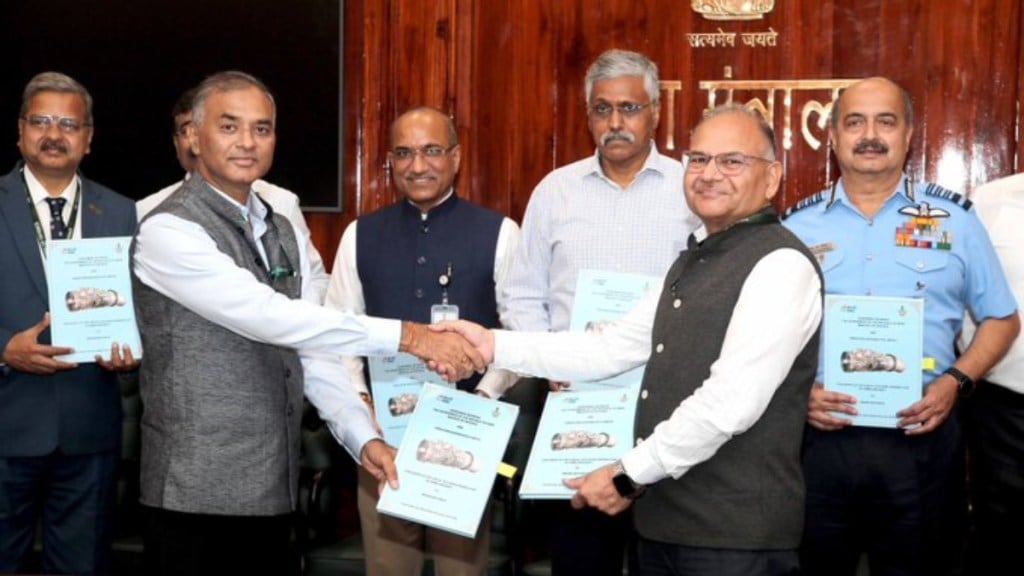In a landmark development for India’s defence sector, the Ministry of Defence (MoD) has secured a substantial contract with Hindustan Aeronautics (HAL) for the supply of 240 AL-31FP Aero Engines, valued at over Rs 26,000 crore. The agreement, signed today (Sept 9, 2024), marks a significant step in India’s drive towards self-reliance under the Aatmanirbhar Bharat initiative. The contract was formalized in New Delhi in the presence of Defence Secretary Giridhar Aramane and Chief of the Air Staff Air Chief Marshal VR Chaudhari.
The AL-31FP engines will be produced by HAL’s Koraput Division and are crucial for maintaining the operational capabilities of the Su-30MKI fleet. Under the contract, HAL will deliver 30 engines annually, with the entire delivery scheduled to be completed over the next eight years. This endeavour will leverage India’s defence manufacturing ecosystem, including support from micro, small, and medium enterprises (MSMEs) and various public and private sectors.
According to an official statement issued by the Ministry of Defence (MoD) a key component of this contract is HAL’s plan to increase the indigenisation of engine components. By the end of the delivery period, HAL aims to achieve a 63% indigenisation rate, up from the current average of over 54%. This enhancement will not only support the local defence manufacturing base but also boost the indigenous content in repair and overhaul tasks, strengthening the overall defence infrastructure.
Globally, the military aircraft engines market is witnessing substantial investments. According to GlobalData‘s report, “The Global Military Aircraft Engines Market Forecast 2024-2034,” India is expected to invest approximately US$12.4 billion in engine procurement for various military platforms over the next decade. Military fixed-wing aircraft engines are projected to account for about 77% of this expenditure.
Aamir Chowdhury, Aerospace & Defence Analyst at GlobalData, underscores the strategic significance of this procurement. “The acquisition of AL-31FP engines enhances the Indian Air Force’s combat readiness, particularly in light of regional threats from China. With China’s advanced J-20 fighters deployed in high-altitude regions such as Tibet and along the Line of Actual Control (LAC), these engines are vital for maintaining the operational agility of the Su-30MKI fleet, enabling it to address potential threats effectively in sensitive areas.”
China’s strategic manoeuvres, including its ‘String of Pearls’ initiative—which involves expanding military and commercial infrastructure around India’s borders and key maritime routes—pose a growing security challenge for India. The enhanced capabilities provided by the AL-31FP engines will help India counter these threats and maintain a robust defence posture.
The AL-31FP engines, known for their advanced thrust vectoring capabilities, significantly boost the Su-30MKI’s agility and combat effectiveness. This improvement is essential for maintaining air superiority and ensuring the aircraft’s readiness for complex aerial manoeuvres.
Chowdhury further highlights the importance of this acquisition in the broader context of India’s regional security dynamics. “With the increasing military collaboration between China and Pakistan, such as the co-development of the JF-17 aircraft, it is crucial for India to sustain a fleet capable of conducting long-range strikes and air defence missions. The AL-31FP engines will provide the necessary flexibility to project airpower across high-altitude regions like Ladakh and the Tibetan plateau, as well as along India’s maritime borders in the Indian Ocean.”
This strategic move not only reinforces India’s defence capabilities but also underscores its commitment to self-reliance in military manufacturing. As India faces evolving regional threats, this investment in its Su-30MKI fleet represents a pivotal step in securing its national interests and maintaining a robust defence posture in the face of global and regional challenges.
